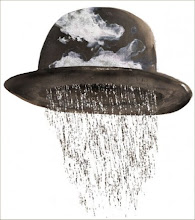Jaw-Jaw, Better than War-War
If America Wanted to Talk, Iran Would ...
In the New York Times (3-Sep-06), Tom Slackman asked:
If America Wanted to Talk, Iran Would ...
Would reaching out to Iran, like agreeing to hold direct talks with Iran’s president, do much to persuade Iran’s leaders to give up their willingness to pursue a nuclear program at any cost?
In Iran’s case, though, political analysts and Western diplomats here say, that kind of dramatic effort would probably fall flat, at least at first.
Iran’s leaders are certain the West wants to remove them from power, and so their first response, many analysts here said, would be to charge that Washington was laying a trap. The second reaction would be to say that the change validated the hard-line approach toward the West — that belligerence had worked, and that more intransigence would get more such results. So, at least in the short term, the public posturing and bluster would continue.
But is Washington thinking only about the short term?
. . . . A gesture from Washington to Tehran, or more precisely a gesture that demonstrates some degree of respect and openness to Iran, might well be seen here as far more threatening to the leadership than the threat of economic or political sanctions.
....In Iran, the term hard-liner is part of the political lexicon, less a pejorative title than a label along the lines of liberal or conservative. In that vein, many Iranians refer to President Bush and his administration as hard-liners. And the conventional thinking here is that hard-liners help hard-liners, with their hard-line policies.
. . . . Iranian officials have cracked down on those who criticize the government, and they have effectively silenced any debate over their nuclear program. A political analyst with a prominent research institute in Tehran who insisted on anonymity out of fear of punishment, says:
The forces who advocate integration of Iran into the international system are in the minority today. The leadership is opposed to international integration. They are afraid the purity of their system would be broken, lost.
. . . . Former President Ali Akbar Hashemi Rafsanjani tried to build economic ties with foreign capitals and attract foreign investment. His successor, Mohammad Khatami, talked of a dialogue of civilizations and used the language of diplomacy.
. . . . Today, more than at any time in many years, Iran’s most powerful figures define themselves with the language of revolution.
. . . . President Ahmadinejad, in contrast, talks of returning to the values of the revolution. An engineer by training, he has nevertheless crafted a persona that seems to meld the combativeness of a cleric and the populism of Venezuela’s Hugo Chávez.
. . . . President Ahmadinejad and his inner circle benefit from the isolation that comes from the argument over nuclear proliferation. It would be hard to maintain that posture while ushering Iran into the World Trade Organization, for example, or into a trade agreement with the United States.
Mohsen Kadivar, a senior reform-minded cleric, said of the hard-liners:
When the West threatens isolation, they welcome it. They cannot integrate. They feel if Iran integrated it would lose its Islamic identity.


1 Comments:
Regime change in Iran?
We already changed the regime in Iran once, back in 1953. Look how well that worked out.
Post a Comment
<< Home